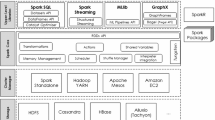Abstract
One of the challenges of managing an RDF database is predicting performance of SPARQL queries before they are executed. Performance characteristics, such as the execution time and memory usage, can help data consumers identify unexpected long-running queries before they start and estimate the system workload for query scheduling. Extensive works address such performance prediction problem in traditional SQL queries but they are not directly applicable to SPARQL queries. In this paper, we adopt machine learning techniques to predict the performance of SPARQL queries. Our work focuses on modeling features of a SPARQL query to a vector representation. Our feature modeling method does not depend on the knowledge of underlying systems and the structure of the underlying data, but only on the nature of SPARQL queries. Then we use these features to train prediction models. We propose a two-step prediction process and consider performances in both cold and warm stages. Evaluations are performed on real world SPRAQL queries, whose execution time ranges from milliseconds to hours. The results demonstrate that the proposed approach can effectively predict SPARQL query performance and outperforms state-of-the-art approaches.









Similar content being viewed by others
Notes
References
Ahmad, M., Duan, S., Aboulnaga, A., Babu, S.: Predicting completion times of batch query workloads using interaction-aware models and simulation. In: Proceedings of the 14th international conference on extending database technology (EDBT 2011), pp. 449–460. Uppsala, Sweden (2011)
Akdere, M., Ċetintemel, U., Riondato, M., Upfal, E., Zdonik, S.B.: Learning-based query performance modeling and prediction. In: Proceedings of the 28th international conference on data engineering (ICDE 2012), pp. 390–401. Washington DC, USA (2012)
Altman, N.S.: An Introduction to Kernel and Nearest-Neighbor Nonparametric Regression. Am. Stat. 46(3), 175–185 (1992)
Bursztyn, D., Goasdouė, F., Manolescu, I.: Optimizing reformulation-based query answering in RDF. In: Proceedings of the 18th international conference on extending database technology (EDBT 2015), pp. 265–276. Brussels, Belgium (2015)
Chang, C., Lin, C.: LIBSVM: A library for support vector machines. ACM Trans. Intell. Syst. Technol. 2(3), 27 (2011)
Duggan, J., Ċetintemel, U., Papaemmanouil, O., Upfal, E.: Performance prediction for concurrent database workloads. In: Proceedings of the 2011 international conference on management of data (SIGMOD 2011), pp. 337–348. Athens, Greece (2011)
Ganapathi, A., Kuno, H.A., Dayal, U., Wiener, J.L., Fox, A., Jordan, M.I., Patterson, D.A.: Predicting Multiple Metrics for Queries: Better Decisions Enabled by Machine Learning. In: Proceedings of the 25th international conference on data engineering (ICDE 2009), pp. 592–603. Shanghai China (2009)
Gubichev, A., Neumann, T.: Exploiting the query structure for efficient join ordering in SPARQL queries. In: Proceedings of the 17th international conference on extending database technology (EDBT 2014), pp. 439–450. Athens, Greece (2014)
Hasan, R.: Predicting SPARQL query performance and explaining linked data. In: Proceedings of the 11th extended semantic web conference (ESWC 2014), pp. 795–805. Anissaras, Crete, Greece (2014)
Hotelling, H.: Relations between two sets of variates. Biometrika 28(3/4), 321–377 (1936)
James, G., Witten, D., Hastie, T., Tibshirani, R.: An Introduction to Statistical Learning. Springer, Berlin (2013)
Jolliffe, I.: Principal Component Analysis. Wiley Online Library, New York (2002)
Lee, D.D., Seung, H.S.: Learning the parts of objects by non-negative matrix factorization. Nature 401(6755), 788–791 (1999)
Li, J., Kȯnig, A.C., Narasayya, V.R., Chaudhuri, S.: Robust Estimation of Resource Consumption for SQL Queries using Statistical Techniques. The VLDB Endowment (PVLDB) 5(11), 1555–1566 (2012)
Morsey, M., Lehmann, J., Auer, S., Ngomo, A.N.: Usage-Centric Benchmarking of RDF Triple Stores. In: Proceedings of the 26th AAAI conference on artificial intelligence. Toronto, Canada (2012)
Neumann, T., Moerkotte, G.: Characteristic sets: Accurate cardinality estimation for RDF queries with multiple joins. In: Proceedings of the 27th international conference on data engineering (ICDE 2011), pp. 984–994. Hannover, Germany (2011)
Pėrez, J., Arenas, M., Gutierrez, C.: Semantics and Complexity of SPARQL. ACM Trans. Database Syst. 34(3), 16:1–16:45 (2009)
Quilitz, B., Leser, U.: Querying distributed rdf data sources with sparql. In: Proceedings of the 5th Extended Semantic Web Conference (ESWC 2008), pp. 524–538. Tenerife, Spain (2008)
Rajaraman, A., Ullman, J.D.: Mining of Massive Datasets. Cambridge University Press, Cambridge (2011)
Smola, A., Vapnik, V.: Support Vector Regression Machines. Adv. Neural Inf. Proces. Syst. 9, 155–161 (1997)
Stocker, M., Seaborne, A., Bernstein, A., Kiefer, C., Reynolds, D.: SPARQL Basic Graph Pattern Optimization Using Selectivity Estimation. In: Proceedings of the 17th international world wide web conference (WWW 2008), pp. 595–604. Beijing, China (2008)
Tozer, S., Brecht, T., Aboulnaga, A.: Q-Cop: Avoiding bad query mixes to minimize client timeouts under heavy loads. In: Proceedings of the 26th international conference on data engineering (ICDE 2010), pp. 397–408. Long Beach, USA (2010)
Tsialiamanis, P., Sidirourgos, L., Fundulaki, I., Christophides, V., Boncz, P.A.: Heuristics-based query optimisation for SPARQL. In: Proceedings of the 15th International Conference on Extending Database Technology (EDBT 2012), pp. 324–335. Uppsala, Sweden (2012)
Wu, W., Chi, Y., Zhu, S., Tatemura, J., Hacigu̇mu̇s, H., Naughton, J.F.: Predicting query execution time: Are optimizer cost models really unusable?. In: Proceedings of the 29th International Conference on Data Engineering (ICDE 2013), pp. 1081–1092. Brisbane Australia (2013)
Wu, X., Kumar, V., Quinlan, J.R., Ghosh, J., Yang, Q., Motoda, H., McLachlan, G.J., Ng, A.F.M., Liu, B., Yu, P.S., Zhou, Z., Steinbach, M., Hand, D.J., Steinberg, D.: Top 10 algorithms in data mining. Knowl. Inf. Syst. 14(1), 1–37 (2008)
Zhang, W.E., Sheng, Q.Z.: Searching the Big Data: Practices and Experiences in Efficiently Querying Knowledge Bases. In: Handproceedings of big data technologies, pp. 429–453 (2017)
Zhang, W.E., Sheng, Q.Z., Taylor, K., Qin, Y.: Identifying and Caching Hot Triples for Efficient RDF Query Processing. In: Proceedings of the 20th International Conference on Database Systems for Advanced Applications (DASFAA 2015), pp. 259–274. Hanoi, Vietnam (2015)
Author information
Authors and Affiliations
Corresponding author
Rights and permissions
About this article
Cite this article
Zhang, W.E., Sheng, Q.Z., Qin, Y. et al. Learning-based SPARQL query performance modeling and prediction. World Wide Web 21, 1015–1035 (2018). https://doi.org/10.1007/s11280-017-0498-1
Published:
Issue Date:
DOI: https://doi.org/10.1007/s11280-017-0498-1




